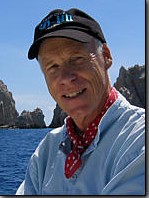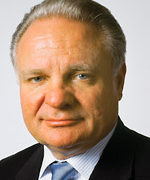Joe Macinnis
Dr. Joe MacInnis is a physician-scientist, author and deep-sea explorer. He has led 30 expeditions into the Atlantic, Pacific and Arctic Oceans and written ten books about undersea exploration. His work has earned him a number of distinctions, including his country’s highest honor, the Order of Canada.
Dr. MacInnis spent ten years studying the physiology and psychology of men and women working in the depths of the sea as well as leadership in lethal environments. He is continually searching for new ways to improve the relationships between the human family and the natural world.
In the 1960s, Dr. MacInnis was the medical director of the American Man-in-Sea program and worked on the U. S. Navy’s Sea Lab project. In the 1970s and 80s he led the teams that made the first scientific dives under the North Pole and discovered the world’s northernmost known shipwreck— HMS Breadalbane—under the ice of the Northwest Passage. Dr. MacInnis was an advisor to the Titanic discovery team and co-leader of a $5-million expedition to film Titanic in the giant-screen Imax format. It was this expedition that inspired James Cameron’s Academy Award winning movie.
Dr. MacInnis is currently working with James Cameron on deep-sea documentary films and writing a book on leadership.
Speech Topics
Deep Leadership: The Quest for 21st Century Leadership
Oil Storm: Leadership Lessons from the Gulf of Mexico
Dr. MacInnis outlines 12 essential traits of leadership and shows why the ‘oilstorm’ was a crucible for both effective and failed leadership. Using dramatic video clips, he reveals how great leaders acquire and use the essential traits to enhance personal performance.
Leadership When Your Life Depends On It
In times of turbulent change, the best option is deep leadership
Profiles of Leadership
Deep Leadership: A Personal Journey
JOE MACINNIS BOOKS:


Full Biography
Joe MacInnis is a medical doctor who studies leadership and teamwork in life-threatening environments from the deep ocean to outer space. He’s led thirty expeditions under the Atlantic, Pacific and Arctic Oceans including the first team of scientists to dive under the ice at the North Pole. His work has earned him many honours including the Order of Canada.
Dr. MacInnis has worked on science and engineering projects with the US Navy, the Canadian government, the Russian Academy of Sciences and NASA. He’s currently studying the leadership and teamwork allowing astronauts to construct the International Space Station and sub pilots to navigate $25-million research subs to the ocean’s deepest depths.
In 1962, Joseph MacInnis graduated in medicine from the University of Toronto. After his internship at the Toronto General Hospital he was awarded a Link Foundation Fellowship to study diving medicine at the University of Pennsylvania under Dr Christian J. Lambertsen. In 1964, he became medical director of Edwin Link’s Man-In Sea Project and in 1965 medical director of Link’s new company, Ocean Systems Inc. Between 1964 and 1970, as Ocean Systems became the world’s largest diving and underwater engineering company, Dr. MacInnis and his associates carried out some of the deepest and longest dives ever made, including a 48 hour saturation dive to 432 feet in the Caribbean (1964), a 48 hour saturation dive to 636 feet in the Gulf of Mexico (1967) and a 700 foot submarine lock-out dive in the Caribbean (1968). In 1969, he became a medical consultant to the United States Navy’s SEA LAB 3 program.
In 1970, Dr. MacInnis was asked by Prime Minister Pierre Trudeau to assist in the research and writing of Canada’s first national ocean policy. At the same time, supported by the Canadian government, he initiated the first of eleven diving expeditions to study the systems and techniques needed to work safely under the ice in the near-freezing waters of the Arctic Ocean. During the next ten years, the more than one thousand dives made by his teams, from Alaska to Baffin Island to the North Pole, included the construction of Sub Igloo, the world’s first undersea polar station, the first filmed encounters with Harp seals and Bowhead, Narwhal and Beluga whales, and the first science dives ever made under the pack ice at the North Pole.
Between 1978 and 1983, Dr. MacInnis led the team that discovered, explored, and filmed HMS Breadalbane, a three-masted British barque crushed by the ice in the Northwest Passage in 1853. Located in 340 feet of water 600 miles north of the Arctic Circle, HMS Breadalbane is the world’s northernmost known shipwreck.
In 1984, Dr. MacInnis turned his attention to the study of humans and machines exploring the deep ocean. In 1985, he was an advisor to the Titanic discovery team and two years later made his first dive to the wreck. Between 1985 and 1991, in the Russian Mirs and French Nautile research subs, his deep ocean dives included a 10,000-foot dive into Monterey Canyon, a 16,000-foot descent into the eastern Atlantic and two dives to the bow and stern sections of the Titanic. In 1991, he was co- leader of one of the most daring deep sea projects ever conducted, a two million dollar expedition to film Titanic in the Imax giant-screen format and the first to study the great ship in her biological, geological and metallurgical contexts. It was this expedition that inspired James Cameron’s Hollywood film.
In 1993, Dr. MacInnis was given a contract by the International Joint Commission to study how evolving media techniques could be used to enhance the cleanup of the Great Lakes and St. Lawrence River. In 1994, as a result of this study, he led the team that made the first multiple research sub dives to the wreck of the Edmund Fitzgerald in Lake Superior and a 19th century schooner in Lake Erie. Between 1996 and 2004, Dr. MacInnis chaired the TD Financial Group’s Friends of the Environment Foundation – a unique partnership between the TD bank and its customers. The Foundation has contributed more than 40 million dollars to environmental projects across Canada.
Dr. MacInnis is actively involved in a number of community service projects including the Trudeau Foundation in Montreal, Pearson College of the Pacific in Victoria, Pollution Probe, the World Wildlife Fund, and the Trudeau Center for Peace and Conflict Studies at the University of Toronto.
Dr. MacInnis is working with the Academy Award winning director James Cameron on a series of deep-sea documentaries. In 2003, he accompanied Cameron and his team on a two-month, $14- million expedition into the Atlantic and Pacific Oceans. Using two ships, four research subs and a video-cam robot they made 40 dives at ten hydrothermal vent sites. Found at depths down to 4000 meters, the vents are surrounded by bizarre communities of life. Cameron edited the footage into a 3-D Imax film called Aliens of the Deep. The film and Dr. MacInnis’ companion book were released in 2005.
In 2005, Dr. MacInnis joined Cameron and his team on a $7-million Discovery Channel expedition to explore some of the last unseen rooms inside Titanic and produce a 90-minute live broadcast from the wreck. The expedition featured the first-ever surface-to-seafloor communication system and four new extreme-depth video-cam robots. Ten dual dives were made in the Russian Mir subs. The live broadcast-from an $8-million broadcast studio on the ship-aired on July 24. Dr. MacInnis’ book on the expedition, Titanic Dreams, will be released in 2008. Each year, Dr. MacInnis makes more than 20 motivational presentations on leadership and teamwork to Fortune 500 companies that have included IBM, Microsoft, Toshiba, Fidelity, Ford and Merrill-Lynch.
Dr. MacInnis is currently developing Wisdom Keepers a multi-media series to inspire ingenuity and enterprise in young people. The series, featuring short interviews with artists, scientists, entertainers, politicians, poets and business executives will be released in 2009.
Dr. MacInnis has written ten books and numerous articles for newspapers and magazines, including Scientific American, National Geographic and Wired. His books include Underwater Man, Saving the Ocean, Fitzgerald’s Storm, Titanic in a New Light, and Surviving Terrorism. His two most recent books, Breathing Underwater (Penguin) and Aliens of the Deep (National Geographic Books) were published in 2005.
Expertise: BUSINESS | Creativity | Deep Sea Expeditions | ENTERTAINMENT | Filmmakers | Leadership | Science











